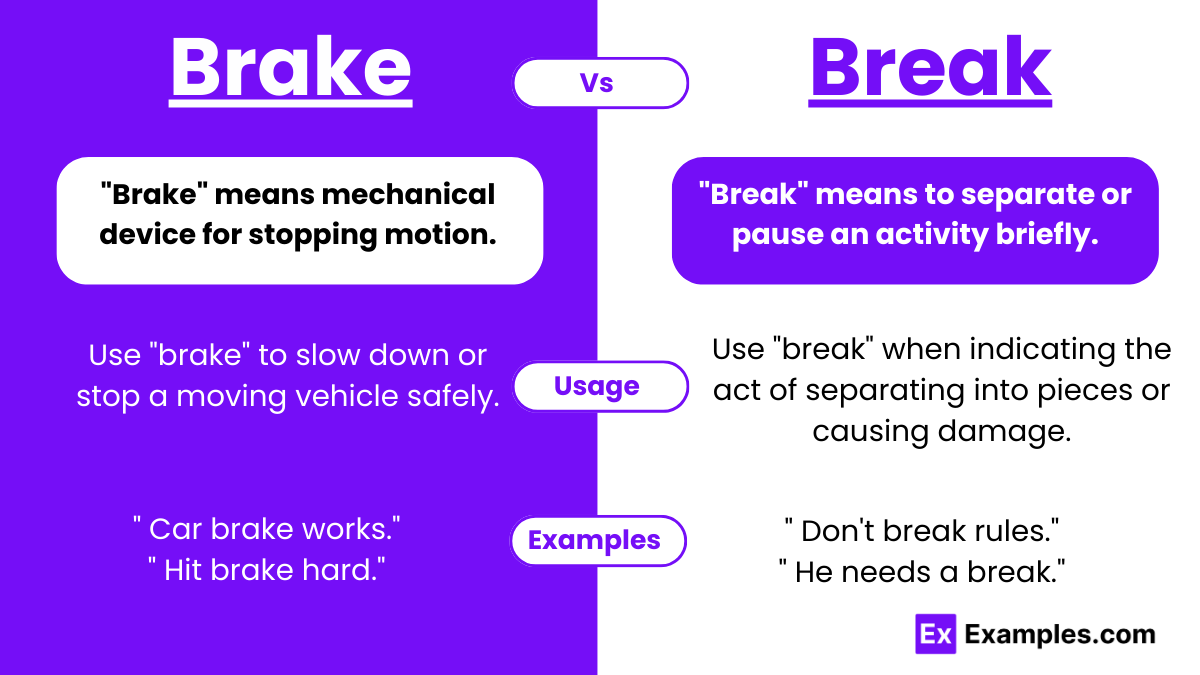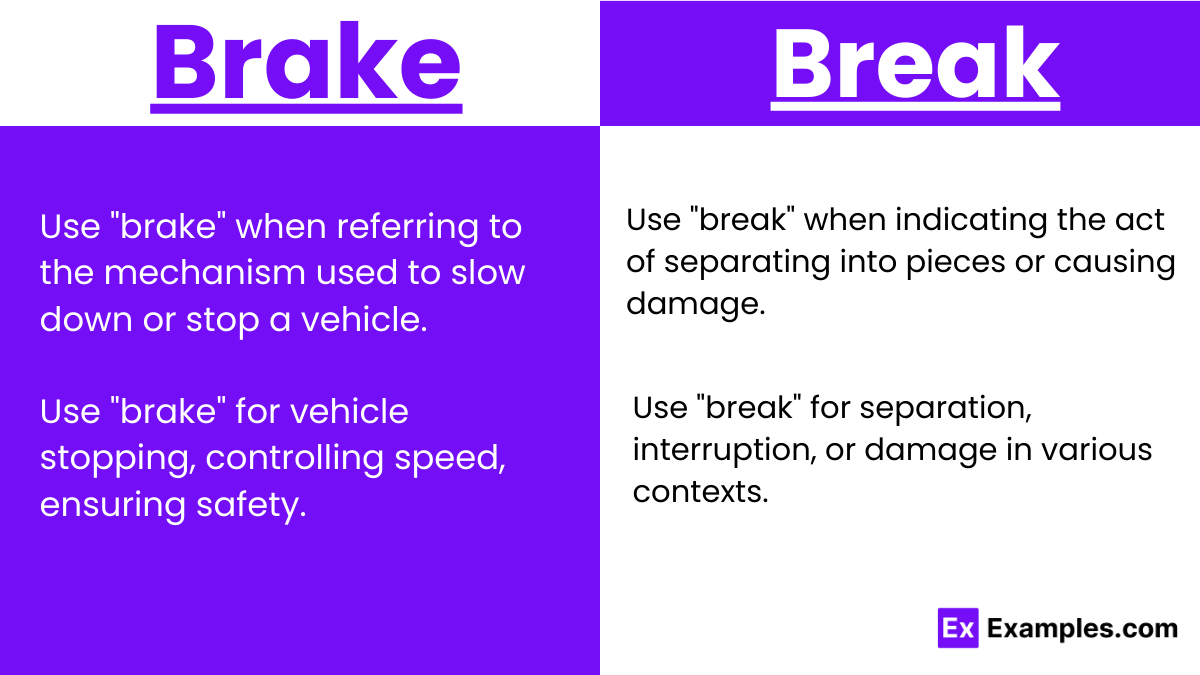Brake vs Break – Meanings, Differences, Usage, Examples
Unlock the nuances of “Brake vs Break” in this comprehensive guide. Communication is key as we delve into real-world examples, dissect effects, and unveil warning signs. From understanding the mechanics to deciphering context, equip yourself with the knowledge to navigate linguistic terrain confidently. Whether you’re a writer, linguist, or simply curious, this guide will illuminate the distinctions between these often-confused terms, empowering effective communication in both verbal and written forms.
Brake vs Break – Meanings
- “Brake” refers to a mechanical device used to slow down or stop motion, typically in vehicles or machinery. It functions by applying friction to rotating parts, converting kinetic energy into heat energy, and ultimately reducing speed or bringing to a halt. In automotive contexts, brakes are crucial for safety, enabling drivers to control speed and maneuver effectively on roads. Whether disc brakes or drum brakes, understanding their operation is fundamental for safe driving practices.
- “Break” denotes an act of separation, disruption, or fracture. It spans various contexts, from physical objects splitting apart to interruptions in continuity or routines. Whether it’s a bone fracture, a pause during work, or a rupture in a relationship, the concept of “break” implies a cessation or alteration of previous states. Understanding the diverse interpretations of “break” is essential for effective communication and navigating its implications in different contexts.
Summary
Brake” refers to a mechanical device crucial for slowing down or stopping motion, vital for vehicle safety and control. On the other hand, “Break” signifies a separation or disruption, ranging from physical fractures to interruptions in routines or relationships. Understanding the functionality of Brakes ensures safe driving practices, while grasping the varied meanings of “Break” facilitates effective communication across diverse contexts, be it in engineering, daily life, or interpersonal relationships.
How To Pronounce Brake and Break
How to Pronounce “Brake”:
- “Brake” is pronounced as “breyk.”
- Emphasize the “ay” sound in the middle.
- The ending “k” sound is sharp and clear.
How to Pronounce “Break”:
- “Break” is pronounced as “breyk” as well.
- Like “brake,” emphasize the “ay” sound in the middle.
- The ending “k” sound is also pronounced sharply.
Differences Between Brake and Break
| Aspect | Brake | Break |
|---|---|---|
| Definition | A mechanical device for slowing or stopping motion. | To separate into pieces or to cause damage. |
| Usage | Typically used in the context of vehicles. | Used in various contexts, including objects and actions. |
| Examples | Applying brakes to a car. | Breaking a window. |
| Functionality | Enables control of speed and ensures safety. | Indicates damage or interruption of activity. |
| Pronunciation | Pronounced as “breyk.” | Pronounced as “breyk” as well. |
| Rhymes With | Lake, bake. | Cake, stake. |
How to Remember the Differences Between “Brake” and “Break”
- Visualize Action: Picture a car slowing down when you hear “brake,” emphasizing the action of slowing or stopping. For “break,” envision a shattered object, emphasizing the concept of separation or damage.
- Mnemonic Devices: Create a phrase like “Brake before you Break” to reinforce the idea that using brakes prevents damage or accidents. Alternatively, associate “break” with a break in continuity, like taking a break from work, to remember its interruption or separation meaning.
- Word Association: Connect “brake” with words like “car” or “stop” to solidify its association with vehicles and motion control. For “break,” link it with terms like “damage” or “pause” to remember its meanings related to separation and interruption.
When to Use Brake and Break
Usage of Brake:
- Use “Brake” when referring to the mechanism used to slow down or stop a vehicle. For example, “Apply the brake gently to come to a smooth stop.”
- It also applies metaphorically to slowing down or stopping any process or action. For instance, “He decided to put the brakes on his spending habits.”
Usage of Break:
- Use “Break” when indicating the act of separating into pieces or causing damage. For example, “Be careful not to break the glass when moving the furniture.”
- It can also refer to taking a pause or interrupting a continuous action. For instance, “Let’s take a coffee break before continuing our work.”
Brake and Break Examples
Brake Examples:
- I had to slam on the brake to avoid hitting the deer crossing the road.
- Make sure to apply the parking brake when you park on a steep hill.
- The bicycle’s brake pads needed replacing after years of use.
- He gently tapped the brake to slow down as he approached the red light.
- The car’s brake lights flashed brightly as it came to a sudden stop.
Break Examples:
- She accidentally used too much force and managed to break the fragile vase.
- Please don’t break the silence; let’s enjoy the peaceful atmosphere.
- She desperately needed a break from her hectic schedule.
- After a long day at work, he decided to take a break and go for a walk.
- Try not to break the rules; they are in place for everyone’s safety.
Synonyms For Brake and Break
| Brake | Break |
|---|---|
| Slow | Shatter |
| Halt | Smash |
| Stop | Fracture |
| Decelerate | Split |
| Pause | Interrupt |
Exercise
Instructions: Fill in the blanks with the appropriate word, “brake” or “break,” to complete each sentence correctly.
- He gently tapped the __________ to slow down as he approached the red light.
- Please don’t __________ the fragile vase; it’s an antique!
- After a long day of hiking, they found a perfect spot to take a short __________.
- The cyclist had to use his __________ to avoid colliding with the pedestrian crossing the street.
- What caused the __________ in communication between the two teams?
- She accidentally used too much force and managed to __________ the delicate ornament.
- The car’s __________ lights flashed as it came to a sudden stop.
- After working non-stop for hours, he decided to take a much-needed __________.
Answers:
- brake
- break
- break
- brake
- break
- break
- brake
- break
FAQ’S
Do you take a brake or break?
I do not take a brake; instead, I take a break. “Brake” refers to a mechanical device for slowing or stopping motion, typically used in the context of vehicles. “Break” means to separate into pieces or to take a pause from an activity. Therefore, the correct choice is “break.”
Is it brake or break a bone?
It is “break” a bone. “Break” refers to separating into pieces or causing damage. “Brake” is a mechanical device for slowing or stopping motion, typically used in vehicles.
How do you use brake and break in a sentence?
He gently pressed the brake to slow down the car. Unfortunately, the impact was severe enough to break the fragile vase in the backseat.
Is it coffee break or brake?
It is “coffee break.” “Break” refers to a pause from an activity. “Brake” is a mechanical device for slowing or stopping motion, typically used in vehicles.




